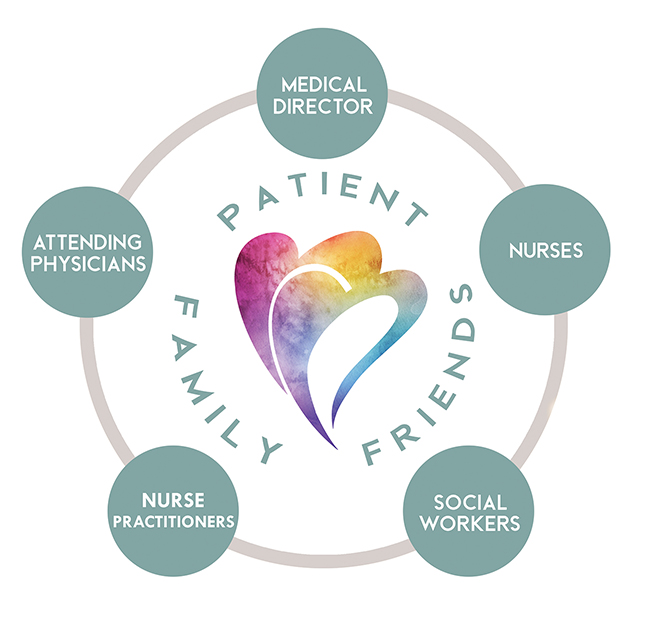Snowline ElderCare Interdisciplinary Team
An Interdisciplinary Team (IDT) is a group of individuals who work together to meet the physical, medical, psychosocial, emotional, and spiritual needs of the ElderCare patient and family. An ElderCare Interdisciplinary Team can include a community physician, the hospice medical director, registered nurses, licensed vocational nurses, medical social workers, spiritual care providers, bereavement coordinators, home health aides, and trained volunteers.
Community/attending physician: These physicians act as the patient’s attending physician and are not Snowline staff members. They are an integral partner in supporting the care of the patient. The physician and the patient care team work collaboratively to ensure the highest quality of care and comfort for the patient. If an individual does not have a community/attending physician, the hospice medical director can act as the attending physician at the request of the patient or designee.
Snowline’s medical director and physicians work closely with the attending physician to ensure comfort and quality of life for the patient. This includes, but is not limited to, care plan oversight, collaboration with the community physician, home visits, and oversight and guidance on symptom management. It is important to note that not all patients receiving hospice services will have a visit from the Snowline physician. The interdisciplinary team provides frequent reports to the Snowline physician who supports care plan oversight and makes recommendations when indicated.


Role of the Medical Director
A Medical Director supervises and coordinates care provided by Nurse Practitioners, Physician Assistants, Registered Nurses, and other members of the healthcare team who visit patients at home. Their job is to ensure quality, healthcare delivery, care coordination with the whole care team, and communication with other providers to meet all the regulatory compliance measures that are necessary to deliver high-quality in-home care. This is a fully trained physician who has reached a point in their career where they can supervise other physicians and ensure Comprehensive Care delivery.
Role of the Attending Physician
Attending Physician refers to the physician who will generally be overseeing most of the patient’s care plan. This could be a primary care provider or a specialist depending on the patient’s preference or disease state that predominates the care plan. This is usually the physician who is ordering medications and interventions or treatments for the patient. Sometimes this is referred to as “Assigned Physician or Provider”
Role of the Nurse Practitioner
Nurse Practitioners are registered nurses who have achieved a higher level of training and have gained the skills to provide diagnostic and treatment acumen. They are frequently the primary providers for a wide range of medical practices and collaborate with clinically experienced physicians. The Nurse Practitioner will be the primary manager of your care plan and will collaborate with other professionals to meet your goals of care.
Role of the Nurse
Nurses: Registered Nurses (RNs, LVNs, etc) make routine home visits to provide medical services to palliative patients. This includes supporting the patient with pain management, addressing other symptoms that cause discomfort, providing instruction on how to care for the patient and overall safety maintenance. The nursing assessment will identify physical symptoms that may need medical intervention, and the nurse provides education when those interventions are recommended. Interventions could include medications, treatments, and/or non-pharmacologic interventions.
Role of the Medical Social Worker
Medical Social Workers evaluate needs and advocate for the rights of the patient. This often includes emotional support and counseling for both the patient and family, support for advanced care planning and POLST creation and completion, and establishing and defining goals of care. Additionally, the Medical Social Worker provides appropriate community resources through collaboration with your Care Team. Resources are often determined by assessing for the patient and family’s identified goals, needs, and strengths.
With these goals in mind, the Medical Social Worker will partner with you to establish an individualized plan of care.
